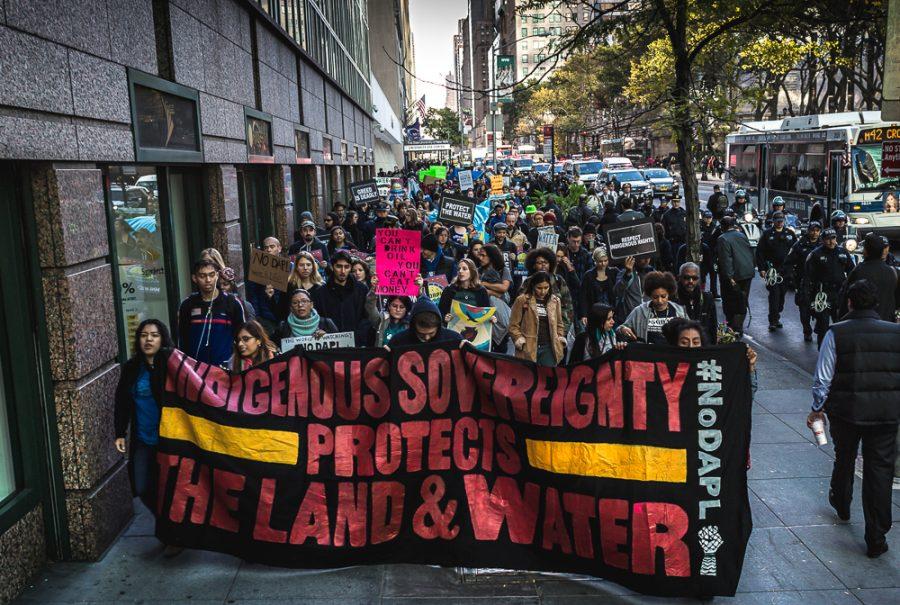Dakota Access Pipeline denied; community reacts
Hundreds of New Yorkers gathered at Grand Central Station in solidarity with the indigenous and non-indigenous allies who are on the front lines in North Dakota fighting the construction of the 3.8 billion dollar Dakota Access Pipeline on Nov. 1 in New York City.
December 5, 2016
For months, protests against the Dakota Access Pipeline made headlines across the nation.
On Sunday, the Army Corps denied easement and announced that the pipeline will be rerouted; however, the location is to be determined.
The pipeline is more than a battle between an oil company and local citizens. For Thereza Lituma, sophomore in FAA, it represented a centuries long conflict between the government and indigenous people.
“The images I see from Standing Rock are so painful. It looks like a war zone,” Lituma said. “They’re spraying protesters with water, they’re shooting rubber bullets, people are being injured, and for me, it’s another attack on the indigenous community and silencing our voices for the profit of the oil companies.”
The decision to reroute the pipeline away from Standing Rock inspired community members to change an upcoming protest outside of the Alma Mater on Dec. 5 to a victory rally.
Get The Daily Illini in your inbox!
“The battle is not won yet,” organizer of the rally Mary Jane Oviatt, junior in ACES. “We need something written in stone that the pipeline won’t be happening at all.”
The pipeline was designed to be a 1,172-mile line connecting the Bakken and Three Forks oil production areas in North Dakota to Patoka, Illinois. Essentially, the plan would enable the transfer of domestically produced oil to different refining markets in a more cost-effective way, according to the official Dakota Access Pipeline Project website.
The controversy around the implementation of the pipeline focused on two important factors: potentially disastrous environmental consequences and disgracing sacred indigenous land at the Standing Rock reservation. Located in both North and South The Sioux tribe, located in both North and South Dakota, resides on the reservation.
“It (was) about money, and (the oil companies) don’t care to look at the people they’re harming and the water,” Lituma said.
Because of the outrage around those two factors, numerous protests sprouted around the country, including in the Champaign-Urbana area. A unity event was planned at the Red Herring Vegetarian Restaurant on Dec. 7.
“This event is for solidarity,” organizer and environmentalist Charlie Harris said. “It’s to help (people) feel empowered and that their voice and their actions do make a difference.”
The biggest concern regarding the environment was about the possible contamination of drinking water in the event of an oil spill.
“(The event) is really about the protection of that resource,” Harris said. “(The pipeline) will contaminate any water if there’s a spill or a leak and that will be extremely detrimental to that water source as a resource.”
Even though the pipeline is being rerouted, the event is still occurring.
“At this point, what will be communicated about the Dakota Access Pipeline is uncertain,” Harris said. “I’m keeping my eyes open about what the leaders of this movement say and what direction they’ll be giving.”
Students and local community members have protested at the University. The Anthropology Leaders, a student advisory body representing the needs and interests of other students, presented an art installation and teach-in event last week to help fuel education about the pipeline.
Four speakers from different departments across the University gave brief presentations about various aspects of the pipeline during the tech-in. The engineering speaker, Ann-Perry Witmer, discussed the disconnect between the oil companies and the people their pipeline is affecting.
“The people that designed this pipeline thought they were doing a beneficial thing, but there was no meeting of the mind, because the decision making ignored the cultural considerations,” Witmer said.
She also made the point that if the water was contaminated, the effects would long outlast our lifetimes.
“Future generations will eventually be impacted, because all water is connected,” she said.
Harris believes that even though the pipeline is being rerouted, the fight is far from over.
“The greater issue is ultimately about water and the natural world and future generations,” Harris said.
While the protesters got their wish for now, there is still a battle over where the pipeline will end up.
“Our hearts are with our people and we’re doing the best we can to raise money and raise supplies,” Lituma said.







